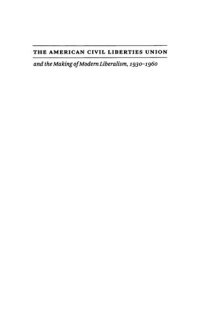
Ebook: The American Civil Liberties Union and the Making of Modern Liberalism, 1930-1960
Author: Judy Kutulas
- Year: 2006
- Publisher: University of North Carolina Press
- Language: English
- pdf
Founded by radicals in 1920, the American Civil Liberties Union experienced several key changes in its formative years. Judy Kutulas traces the history of the ACLU between 1930 and 1960, as the organization shifted from the fringe to the liberal mainstream of American society.
In alternating chapters, Kutulas explores operations at the national level and among the group's local branches. To gain mainstream credibility, the radicals at ACLU headquarters became more professional, began using court challenges rather than direct action, and carefully chose their battles to focus on national security as much as on the protection of dissent. Meanwhile, the group's affiliates, separated from the institutionalization of the national office, maintained the idealism of defending the rights of all individuals, no matter how unpalatable their beliefs and activities.
The shifts at the national level made the ACLU more government-friendly and less radical, but also, Kutulas argues, more timid and weak. Civil liberties activists in ACLU branches around the country ultimately pushed the organization to return to its radical roots in the 1960s. In an afterword, Kutulas addresses how post-9/11 America poses the familiar challenge of balancing national security and individual rights that came to the forefront in the early decades of the ACLU.
In alternating chapters, Kutulas explores operations at the national level and among the group's local branches. To gain mainstream credibility, the radicals at ACLU headquarters became more professional, began using court challenges rather than direct action, and carefully chose their battles to focus on national security as much as on the protection of dissent. Meanwhile, the group's affiliates, separated from the institutionalization of the national office, maintained the idealism of defending the rights of all individuals, no matter how unpalatable their beliefs and activities.
The shifts at the national level made the ACLU more government-friendly and less radical, but also, Kutulas argues, more timid and weak. Civil liberties activists in ACLU branches around the country ultimately pushed the organization to return to its radical roots in the 1960s. In an afterword, Kutulas addresses how post-9/11 America poses the familiar challenge of balancing national security and individual rights that came to the forefront in the early decades of the ACLU.
Download the book The American Civil Liberties Union and the Making of Modern Liberalism, 1930-1960 for free or read online
Continue reading on any device:

Last viewed books
Related books
{related-news}
Comments (0)